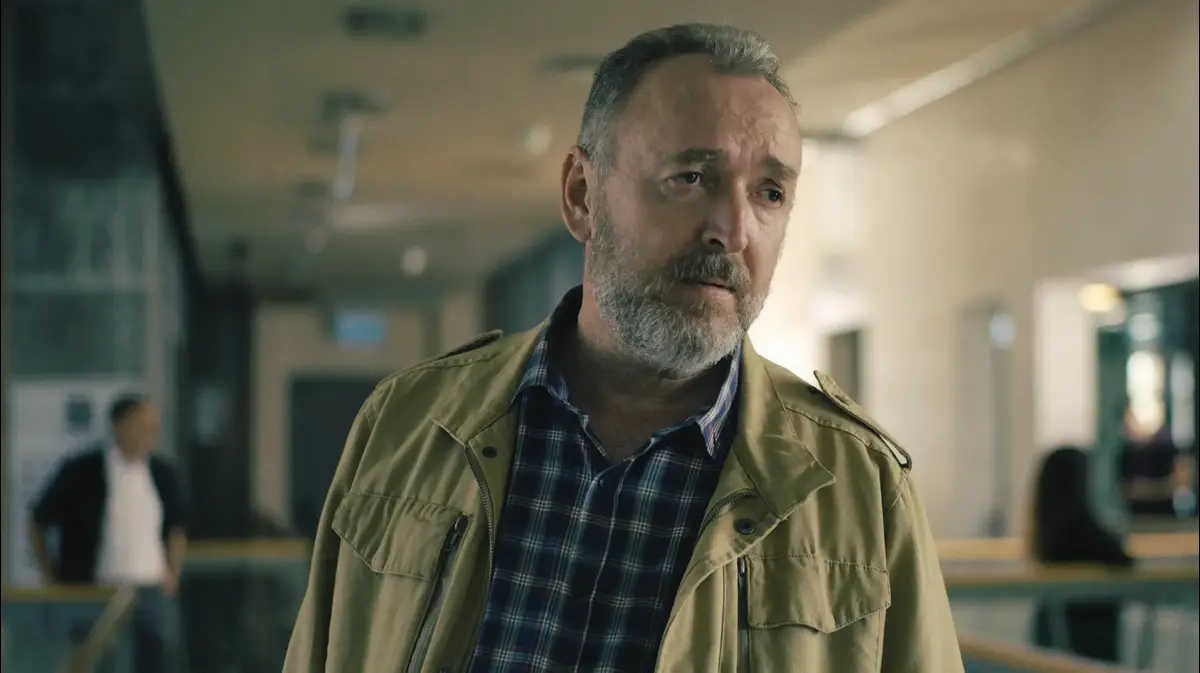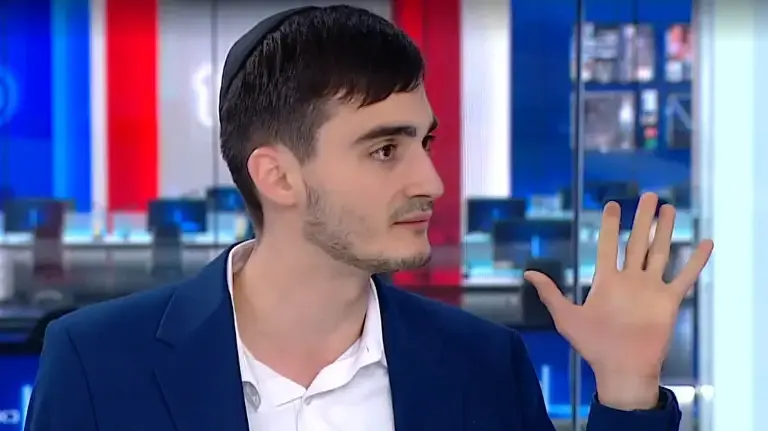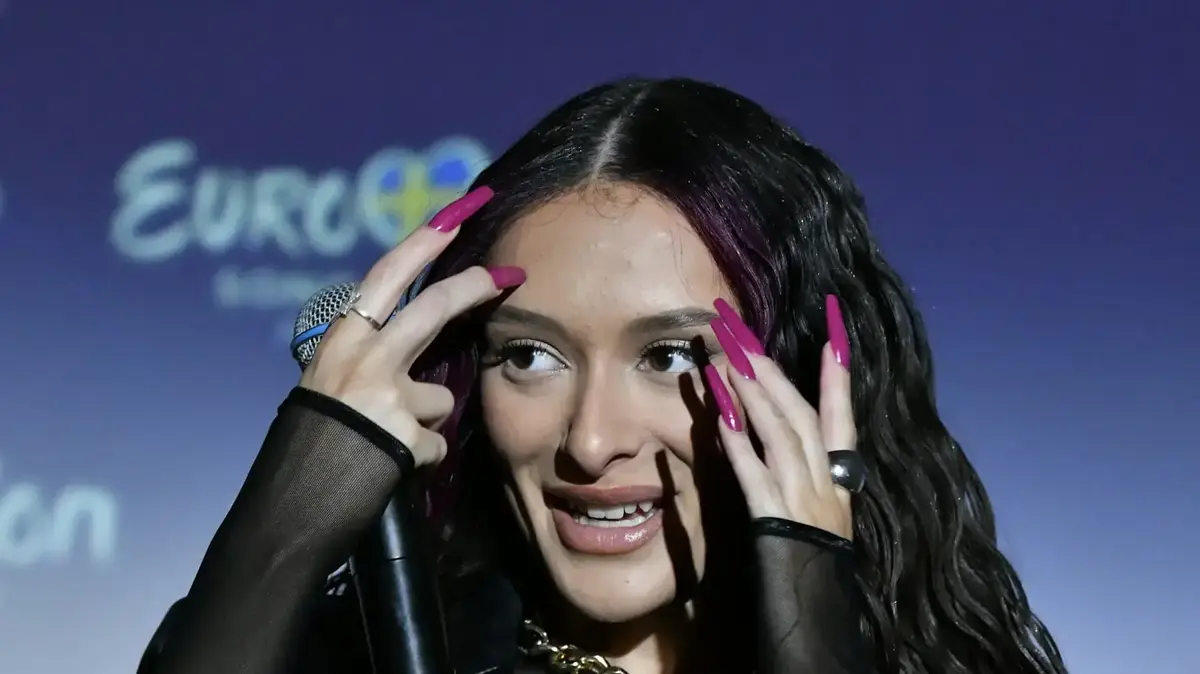culture
TV
Israeli television
Not everything was bad: the 9 best Israeli series of 2004
Although the past year has taken a small step back compared to its predecessor, it has still yielded some Israeli series that have ranged from very successful to perfect.
Among all these there is one particular channel that has managed to squeeze in a third of the content - here 11
Tags
From you
The Jews are coming
that's how it is
Dana Modan
Messiah
Judah
Ido Yeshayahu and Nadav Menuhin
Friday, September 18, 2020, 12:00 p.m.
Share on Facebook
Share on WhatsApp
Share on general
Share on general
Share on Twitter
Share on Email
0 comments
Dana Weiss tries to break into the broadcast of the reporter of Ihud ...
survival
The magician Hezi Din will perform in Dubai, September 2020
The beauty queen of Jerusalem
Cute
Netanyahu: The closure will last three weeks, and it is possible that he ...
Jane Bordeaux and Aya Zehavi Feiglin band in cover version ...
Jacob Buzaglo
Netflix series "Ratched" by Sarah Paulson
The mini-series "The Third Day" of HBO, Jude Law
Excerpt from "That's How It Is" Season 2 (yes)
Exactly a year ago, we summarized the Hebrew decade and listed the ten best series in it.
The year 2009 alone, which marked the end of the decade, provided three of them - evidence of the growing flourishing of Hebrew television work, not only in Israel but all over the world. HOT's "Lose Alice" and Here 11's "Tehran", and Moshe Zonder, who created the latter, even signed an initial agreement with the streaming service. Still, in terms of the quality crop, Tshaf was actually a small step backwards.
There were good series, but too few of them were really amazing or great.
Nonetheless we managed quite easily to put together a list of nine successful series aired this year, a mix of dramas, comedies and what’s in between.
Looking for recommendations or want to recommend new series?
Want to just talk about TV?
Join our Facebook group,
Digging Broadcast
More on Walla!
NEWS
Garbage year: This is how the year 1952 became the most embarrassing year in the history of Israel
To the full article
An entertaining camp.
"Judah" (Photo: Doron Ofer)
9. Judah (HOT)
With the fourth episode that aired yesterday (Thursday) we went through the second half of the second season of the Hebrew vampire series, so you can quite easily point out its weaknesses and especially its virtues.
From the beginning, the idea behind it was brilliant, to connect this all-too-Christian genre - whose villains recoil from crosses and holy water - to Judaism and thus create a new mythology.
In the second season, "Judah"'s use of Judaism became even more sophisticated.
It reveals to us another dimension in the mythology of the creatures of darkness, this time werewolves who turn out to be the descendants of Esau ben Yitzchak - the man whose biblical emphasis emphasizes the excess rate.
It does not end here: since according to the Midrash, Esau's head rolled into the place where his father was buried in the Cave of the Patriarchs, his skull becomes the "McGaffin" of the season, the object that all the various forces in the series are now striving to obtain.
Yes, it has a bit of a silly dimension to it, but "Judah" is aware of it, collects it with both hands and weaves an entertaining camp out of it.
Its effects are impressive and the directing of Manny Yaish ("The Watchers") is cool and stylish in an offensive, not to mention ornate.
Along with the excellent workmanship, the constant correspondence with the ancient history of the Jewish people gives it great freshness and volume.
Human moments, exciting, sometimes disturbing and sometimes full of charm.
"The Appendix" (Photo: Ohad Romano)
8. The Annex (HOT)
The small screen has instilled in us over the years a lot of works that dealt with fish out of water, a person who arrives in a foreign place and is forced to find his place there.
Many times this is a starting point for a comedy about cultural gaps, or for a heartwarming drama about building human bridges.
The great virtue of "The Appendix" - based on the true story of comedian Eli Ben-David ("Puppet of the Night"), who moved with his family to Paris following a job offered to his wife - is the way she distills the dark shades of the concept.
The series effectively assimilates us into its not-always-irrational horror that can take over when we are in a foreign land and do not speak its language.
Unfamiliar language isolates us and leaves us disconnected within the world and our fears.
This is a very refined and very specific sense of alienation, but the impressive thing is that the "appendix" manages to apply it to the characters who are not the hero, Avshalom, and to weave equally powerful stories for them.
The wife Annabel who is struggling for her place in a new and tough workplace, their little son who does not fit into kindergarten, and even the French teacher who is looking for love.
All of this is put into the "appendix" under one umbrella full of very human, moving moments, sometimes unsettling and sometimes full of charm.
And as befits a series that takes place in Paris and makes good use of its landscapes - also incredibly aesthetically pleasing.
Full of brilliance.
"Stockholm" Season 2 (Photo: Doron Ofer)
7. Stockholm (here 11)
Although based on Noa Yadlin's book and defined as a mini-series, the comedy drama won a second season here 11 - something that has happened quite a bit in recent years on American television (i.e. "The Remainers", "Big Little Lies", "13 Reasons" and more) It's perhaps another sign of the sophistication of local television, and it's not for nothing that it's happening in a corporation that has taken over this parade with no less than three series. 2007 is a turning point for here, which has more than ever become the most sane viewing option on screen - almost every time When you sunbathe there you will fall for something interesting.
The corporation also maintained a consistent release of Israeli drama throughout the year, including the cult film "The Rise and Fall of Shem Tov HaAvi", which we could have included in the parade as well.
Here, too, provided the event of the great television drama of the year, "Tehran," followed immediately, remarkably, by a series that also managed to take over the public discourse - "Manaich."
In relation to them a modest series like "Stockholm" seems marginal, but despite the artificial extension of her life she has proven that her power is still at her waist - just like with her elderly protagonists, who prove that Grove is at heart.
Dealing with Death was explicitly presented in the first season - four friends who try to keep their friend's death a secret and by the way have to deal with his rotting corpse - thus radiating on the animals and vitality of those left behind.
In the second season, although there is no body to deal with, the death of the heroes' best friend still hovers over.
The premise of the second season was very simple, very effective and full of brilliance: at the funeral of the deceased comes a mysterious man who knows and remembers them but they are not the same.
The illusions about his identity and nature were a wind in the sails of the series and carried it lightly throughout its eight episodes.
And like the last time, the very focus on heroes in their 70s is refreshing, especially when they are played by stars like Tiki Dayan, Dov Glickman, Sasson Gabay, Laura Rivlin, and the wonderful addition Shlomo Braba.
They too love and hate, their passions are also turbulent, and all this they do in a world that makes sure to try to push them to the margins.
Suddenly we remembered why we loved her.
"Fauda" Season 3 (Photo: Neti Levy)
6. Fauda (yes)
If there is one thing that the third season of "Fauda" has made clear, it is that it is at its peak when it fulfills its name.
When the undercovers are undercover.
Throughout the first half of this season, it continued the downward trend of its predecessor, and then the unit entered Gaza in pursuit of the pair of Israeli hostages.
Suddenly we remembered why we loved this series so much.
When the heroes are surrounded by enemies without anyone being able to save them in case of need, one could feel the horror enveloping, the nerves being torn.
A wonderful Sheriff Ne'eman also helped in her role as Honeysuckle, the Israeli abductee.
She demonstrated an extraordinary ability to excite, making her the beating heart of this whole operation and of the second part of the season, right up until the finale.
These climbs of "Fauda" continue to position her as a television event.
Yes, some of the relationships in it, ones that move away from the conflict and in particular the romance in them, are really embarrassing to watch.
In some parts the weaknesses of the series are revealed in all their frailty.
And yes, almost every episode has moments where you have to suspend logic to really enjoy it.
And yet, "Fauda" always gets back on its feet.
From the faint choices of the characters and the script, excellent moments emerge that make it difficult not to forgive her, and the tension she produces is so tight that it irons the rest of her wrinkles.
Cult pearl.
"This and That" (Network 13 screenshot)
5. This and That (Network 13)
Quietly and steadily, the comedy of Gitit Fischer and Oshrit Seroussi has become a cult gem.
Very few watched it in her box on Friday nights on Network 13, but the voices of those who did watch were loud and clear, spiced with tongue-in-cheek coins like "Yes Commander" or "Ah! Trouble for many!".
Tutit and Milal's attempt to become successful singers - thanks to justified hits like "Scarves in Summer" - failed throughout, but what a way it was!
The two presented a ripping parody of a series of distressing stations of the Israeli experience - from the Western Wall to training bases, from exaggerated weddings to field trips - and at the end discovered that as always, even if the radio gates are still locked, the main thing is to continue to believe you can make your dreams come true.
Seroussi and Fisher have a distinct and polished style of their own, a rather simple nonsense, almost intuitive, not necessarily sophisticated - but absolute and disturbing and original.
In short episodes of 20-25 minutes, you enter - of course without any filters - an amount of text that can be enough for a Scandinavian mini-series.
The whole joke is built on a cumulative effect: not everything is funny, but after a minute of endless sequence in these voices even a silly joke can burst out laughing.
Even if not everything hurts, when it happens it is impossible to breathe with laughter.
Always human.
"Messiah" Season 2 (Photo: Michal Efrati)
4. Messiah (Cellcom TV)
The Israeli screen knows and is well acquainted with oppressive comedies, which more and which less.
"Messiah" surpasses them, first of all because it is hysterically funny, but also because it is not addicted to the carnations that characterize similar series and the period in general.
At the end of the first season not only do you not hate the characters of "Christ", but even like them somewhat deeply.
The second season is even funnier than its predecessor, and no less human.
The dysfunctional guest repeatedly fails in the most miserable battles, but at the end of each episode, around all the stinginess, ignorance, pettiness and lack of self-awareness of Christ and his friends - completely different qualities are revealed: generosity, sensitivity, and especially solidarity - a pact of losers who have no one but the The second.
The interesting thing about this story is that "Messiah" manages to present such a good comedy even without clever sophistication or too pretentiousness, as the tributes to the eighties, the comic crutches of the show, have meanwhile been abandoned in favor of the character's elaboration, even beyond the protagonist Udi Kagan.
Somehow, even though the themes she deals with are not particularly original, thanks to fine acting displays and such deep identification with the characters, it is impossible to take your eyes off it or stop rolling with laughter.
What started as an experimental network series, gradually crystallized into a wonderful and even harmonious show in its second season.
This is currently the number one comedy in Israel.
Bitter, sober, cruel.
"Manaich" (screenshot here 11)
3. Manaich (here 11)
One of the most talked about series of the year, and rightly so.
Shalom Asaig in the lead role reminded those who forgot that he is also a great dramatic actor, and alongside him, "Manaich" introduced one of the best characters on television in the past year: Tal Ben Harush, played by the wonderful Liraz Hammi.
She's just upgrading the series.
While Asaig was excellent but had to constantly dedicate himself to that sad face, Hammi got a meaty figure and bit into it, squirting juicy everywhere.
Despite minor glitches along the way, the bottom line is “Manaich” is a wonderfully impressive drama: bitter, sober, cruel.
Her constant and casual flirtation with the news headlines helped her sizzle more and more throughout the months she aired.
At the same time, a large part of the series' strength, and one that takes on a new validity from its correspondence with reality, is the inseparable connection between the personal and the general.
In a violent and deaf world, the connections between her characters are essential.
The very act of placing the protagonist in front of his best friend was an effective choice that infused human emotions with quasi-gray mechanisms.
Funny and painful.
"The Jews Are Coming" Season 4 (Photo: Natalie Marcus)
2. The Jews are coming (here 11)
The fourth season of the satire series, which is also the longest to date with 15 episodes, included some particularly wonderful sketches.
Including Schindler's "The Factory", Haim Yavin and his colleagues who discover that sexual harassment is no longer allowed, Aramaic cracking, Raful and Arik Sharon convince Begin to open the fence, a variety of sketches in which Yossi Marshak lies on his deathbed and chauvinism, a variety of "Zombie" sketches. That the network will bring with it, Madhat Yosef meets Yosef the Tzaddik at Yosef's tomb, of course;
And more masses, really.
The cast is perfect as always, with an emphasis on MVPs Yael Sharoni and Yaniv Bitton, and the addition of Shira Naor was definitely in place (though next time better without singing clips).
All this happened while the series was receiving a strong protest against the violation of the holy of holies of Israel.
Jewish humor has always existed, from the days of the Bible probably, to the present day. It is a cultural asset that the people of Israel knew how to use well: Jewish existence was not always funny, but a good joke, whether intended by a rabbi or a bully, a beggar or the heroes of the Bible - Always has been.
And with the central place of the Bible in the Zionist ethos, here too it was laughed at quite a bit. However, "Jews are coming" is still an exception - it moves away from the realm of parody to more grotesque and critical areas than usual. The protest against the show, then, is just another link in a long chain of conservative opposition to black humor or satire.It is
probably easier to discern the declared layer of the satire show: to use thousands of years of Jewish events and characters to tell us something about the here and now. The rich Jewish past as a mirror image to our day, connects what was to what will be (and probably also what will be). History in the basic sense - to know what happened to learn lessons, whether it is Yitzhak Avinu or Yitzhak Rabin.
But the wonderful thing that happens by the way, and that What makes "The Jews Are Coming" something special and even exciting, is that the appearance it poses has turned out to be two-sided. Their lives and surroundings to recognizable landscapes.Shapes mounds of interpretations and presents to us
Our ancestors, both of Judaism and of Zionism, as human beings, connect us to them in thickets of familiar flaws.
This is what makes them eternal.
Funny, exciting and captivating.
"That's How It Is" Season 2 (Photo: Ohad Romano)
1. This is how it is (yes)
Just two days before the release of this parade came the series that can be wholeheartedly crowned as flawless, the best this year.
It was not obvious that this would happen.
The first season of Dana Modan, Asi Cohen and Ram Nahari's comedy drama was of course clever and well written, but it was not easy to connect to what she was trying to do - describe the everyday banality so that we too would feel it in full force.
The second season is already much more focused and tight, already in its most basic sense: it has only seven episodes compared to a dozen the previous time, and most episodes count for 20 minutes, sometimes even less.
The series gets rid almost entirely of airy and detailed scenes whose point is understood long minutes before they end - like a routine meal at a restaurant, a prosaic argument at the checkout counter or a foreign couple eating dinner with their children - in favor of something even reminiscent of a plot.
The phase change floods up all its virtues, which among other things makes it much funnier, more exciting and captivating.
This is still the same series.
The bitterness still lingers in the tone of "That's How It Is," and at the base of the series still stands the growing bond between the two protagonists as a counter to anything that sucks: oppressive children, harassing strangers, and even both themselves who sometimes burden each other.
Cohen's character is already somewhere else, more reassured, while Modan's character steps on the spot and may even retreat, including a nostalgic encounter with a childhood friend.
The familiar fatigue of her character sharpens even more in the face of the relative blossoming of Cohen's character.
Most of the time it is hard to decipher on her face what she feels, as if she is so sober and disappointed that even her body no longer bothers to respond to them with too much emotion.
So when a shout is already emanating from her, she sends a shiver up her spine.
The disharmonious progress of the two protagonists casts a spell on the second season, a masterpiece of yin and yang.
The connection between the protagonists, which in the past was based on a partnership of destiny, stands the test of mentioning that love is really painful and who knows what the outcome will be in the end.
Until then it yields a wonderful season and our year series for the year 2006.
Share on Facebook
Share on WhatsApp
Share on general
Share on general
Share on Twitter
Share on Email
0 comments















